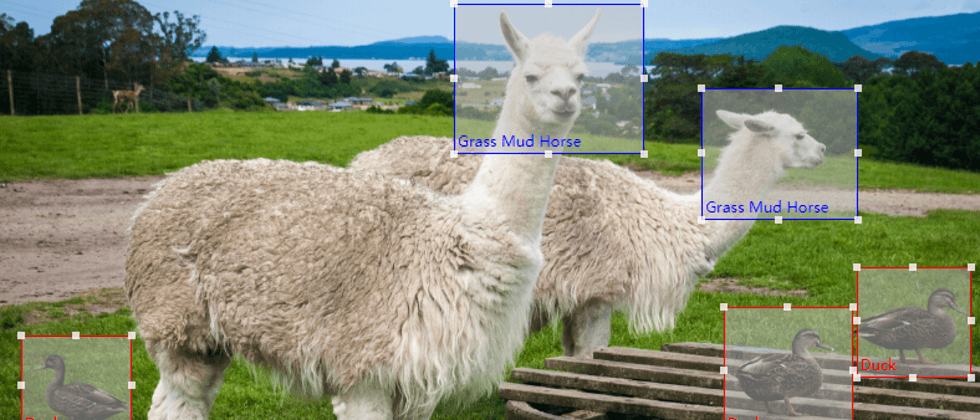演示地址
https://king2088.github.io/simple-image-label/
演示图
开发背景
最近公司要做一个AI在线标注系统,需要对图片进行标注,自己在github找了一些,但是大部分都是很久没有更新或者是不太适合自定义等。当然我也看过CVAT自己的标注,它是采用canvas开发的,不过对于我们目前的项目来说,并不需要canvas,也不需要较为复杂的框选,只需要支持矩形框标注即可,于是自己开发了一个web版的。
简介
simple-image-label是一个基于Web的用户友好型组件,简化了目标检测和深度学习任务中的图片标注过程。该组件采用HTML和JavaScript开发,使用户能够轻松地对图片进行标注并生成标注信息,适用于各种应用场景。
主要特点
- 用户友好的界面:simple-image-label提供直观易用的界面,使图片标注变得轻而易举。其简洁性确保用户无论水平如何,都能轻松地使用该工具。
- 高效标注:借助simple-image-label,用户可以高效地对图片进行标注,添加标签并生成目标检测任务所需的坐标。它简化了标注流程,节省了宝贵的时间和精力。
- 多样兼容性:该组件支持多种标注格式,包括流行的YOLO和VOC等格式。这种兼容性确保了与现有工作流程和深度学习框架的无缝集成。
- 网页便捷性:simple-image-label作为一个基于Web的工具,无需复杂的安装或设置。用户可以直接从Web浏览器中访问和使用该组件,使其便捷且随时可用。
开发过程
simple-image-label的开发过程可以分为以下几个步骤:
创建HTML结构:首先,我们需要创建一个包含图像和标注区域的HTML结构。可以使用以下代码作为起点:
<div class="__simple-image-label__"> <div class="s-image-content"> <img id="label-bg_img" src=""> <div id="labelsContainer" class="label-content"></div> </div> </div>- 初始化组件:在JavaScript中,我们需要初始化simple-image-label组件,为其绑定相关的事件和功能。以下是一个基本的初始化代码示例:
首先先再创label时,指定其矩形的左上顶点x,y轴坐标,以及矩形的宽高,然后将其添加到labelsContainer中
this.labelItem = {
uuid: '', // 随机生成
x: 0, // 百分比 = 左上角x轴坐标 / 当前图片宽度
y: 0, // 百分比 = 左上角y轴坐标 / 当前图片高度
width: 0, // 矩形宽度百分比 = 矩形宽度 / 当前图片宽度
height: 0, // 矩形高度百分比 = 矩形高度 / 当前图片高度
name: '', // 矩形名称
color: '' // 矩形颜色
};
this.labelsContainer.appendChild(this.labelItem);需要注意的是,初始化之前需要等待图片load完成后再执行,防止图片还未load完成,就已经看到所有标签,另外则是为了获取到图片的宽高,方便
// 初始化
this.$w = this.labelsContainer.clientWidth;
this.$h = this.labelsContainer.clientHeight;
this.startPoint = { x: 0, y: 0 };
this.endPoint = { x: 0, y: 0 };
this.labelItem = { uuid: '', x: 0, y: 0, width: 0, height: 0, name: '', color: '' };
this.labelsContainer.onmousedown = (e) => this.mousedown(e);
// 鼠标移动事件
this.labelsContainer.onmousemove = (e) => this.mousemove(e);
// 鼠标抬起事件
this.labelsContainer.onmouseup = (e) => this.mouseup(e);
// 右键点击
this.labelsContainer.oncontextmenu = (e) => {
e.preventDefault();
if (this.contextmenu && typeof this.contextmenu === 'function') {
this.contextmenu(e)
}
};
if (this.readOnly) {
window.removeEventListener('resize', this.resize.bind(this), false);
this.labelsContainer.style.cursor = 'default';
this.clearAllLabelActive();
} else {
this.labelsContainer.style.cursor = 'crosshair';
}
// 监听浏览器缩放,改变label的宽高
window.addEventListener('resize', this.resize.bind(this), false);
this.resizeDotDisplayStatus();当鼠标左键按下时,我们记录下鼠标的位置,并记录鼠标左键按下时的坐标,用于后续计算。
// 计算坐标
const clientLeft = e.clientX - this.getLabelsContainerRelativePoints().x;
const clientTop = e.clientY - this.getLabelsContainerRelativePoints().y;
let x = clientLeft / this.$w; // 转换为百分比
let y = clientTop / this.$h;
this.startPoint = {
x,
y
};当鼠标左键抬起时,我们计算出鼠标左键抬起时的坐标,并计算出鼠标左键按下和抬起时的坐标差,
const clientLeft = e.clientX - this.getLabelsContainerRelativePoints().x;
const clientTop = e.clientY - this.getLabelsContainerRelativePoints().y;
let x = clientLeft / this.$w;
let y = clientTop / this.$h;
this.endPoint = {
x,
y
};这样就可以利用startPoint与endPoint两点只差算出标签的宽高。
labelItem.width = endPoint.x - startPoint.x;
labelItem.height = endPoint.y - startPoint.y;YOLO坐标计算:
YOLO坐标计算方式,[center_x, center_y, width, height],即center_x, center_y为中心点坐标,width,height为宽高(注意:全部按百分比进行表示,如center_x的位置为30%,则表示为center_x为0.3,其他内容相同)。
convertToYoloCoordinate(label) {
const coordinate = this.getCoordinate(label);
const { height, width } = this.imageInfo;
const labelCenterX = (coordinate.x + coordinate.x1) / 2;
const labelCenterY = (coordinate.y + coordinate.y1) / 2;
return [labelCenterX / width, labelCenterY / height, label.width, label.height];
}VOC坐标计算:
VOC坐标计算方式,[xmin, ymin, xmax, ymax],即xmin, ymin为左上角坐标,xmax, ymax为右下角坐标。
对于VOC标注,可以通过simple-image-label组件的 endLabeling 方法来计算标注框的坐标。以下是一个示例代码:
getCoordinate(label) {
const { height, width } = this.imageInfo;
return {
x: label.x * width,
y: label.y * height,
x1: (label.x + label.width) * width,
y1: (label.y + label.height) * height
};
}- 在Vue和React中使用simple-image-label:
如果你正在使用Vue或React,可以将simple-image-label组件包装成可复用的组件,以便在应用程序中使用。以下是一个Vue组件示例: 安装simple-image-label:
npm install simple-image-label -S在Vue组件中引入simple-image-label并使用:
<template> <div id="YourElementId"></div> </template> <script setup> import SimpleImageLabel from 'simple-image-label' import { ref, onMounted } from 'vue'; const simpleImageLabel = ref(null); onMounted(() => { simpleImageLabel.value = new SimpleImageLabel({ el: 'YourElementId' imageUrl: props.imageUrl, labels: props.labels, contextmenu: (e) => { emit('contextmenu', e) }, labelClick: (label) => { emit('labelClick', label) }, error: (e) => { emit('error', e) } }); }) </script>在react组件中使用simple-image-label:
import SimpleImageLabel from 'simple-image-label'; import img from './x.png' import { useEffect } from 'react'; const ImageLabelComponent = () => { let simpleImageLabel = null useEffect(() => { initSimpleDom() }, []) function initSimpleDom() { simpleImageLabel = new SimpleImageLabel({ el: 'YourElementId', imageUrl: img, labels: [], contextmenu: (e) => { console.log(e); }, labelClick: (label) => { console.log(label); }, error: (e) => { console.log(e); } }) } function getAllLabels() { const labels = simpleImageLabel.getLabels() console.log('labels', labels); } return ( <div> <div id="YourElementId"></div> <button onClick={getAllLabels}>Get all labels</button> </div> ); } export default ImageLabelComponent;
项目地址
https://github.com/king2088/simple-image-label
如果你喜欢本项目,记得在github上给我一个Star


**粗体** _斜体_ [链接](http://example.com) `代码` - 列表 > 引用。你还可以使用@来通知其他用户。